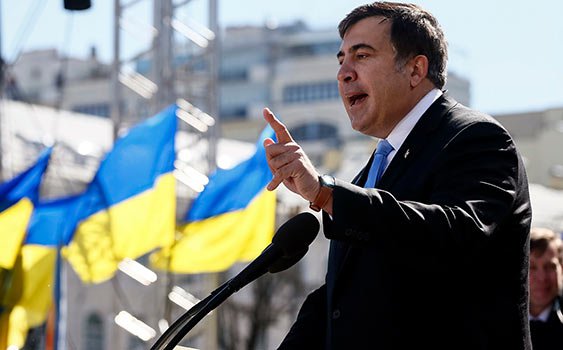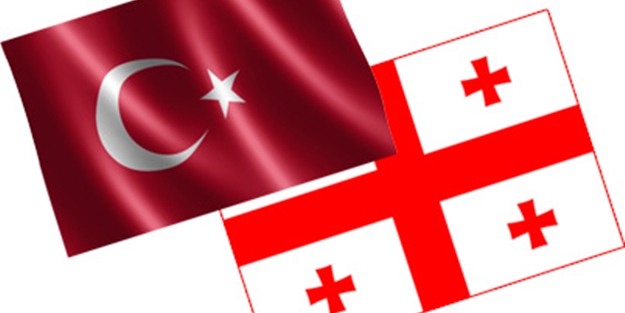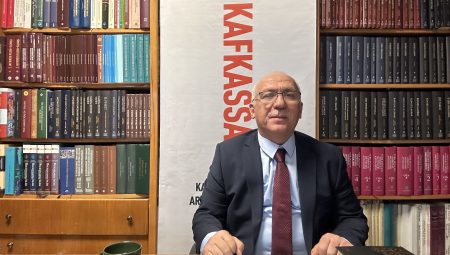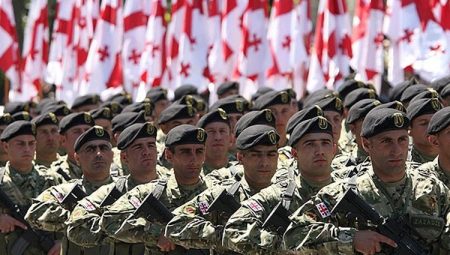Former Georgian President Mikheil Saakashvili has stepped down from his post as governor of the Ukrainian region of Odessa. The resignation closes one chapter on the story of one of the post-Soviet space’s most colorful statesmen, but Saakashvili gave no hint about what his next step might be.
In a press conference to announce his resignation, Saakashvili lashed out at the corruption and ineffectiveness of his former partners in government, particularly President Petro Poroshenko. “What difference for Ukrainians does it make who will treat them like dirt: Poroshenko or Yanukovych; what difference who will steal from them?” Saakashvili said. Tellingly, however, Saakashvili did not even mention Georgia in his address, a fact that did not go unnoticed in Tbilisi.
Since resigning, Saakashvili has posted a number of stories on his Facebook page, lauding his record in Odessa. And he suggested in one post that he intends to continue his career in Ukraine: “Everyone needs to get accustomed to the fact that I’m a Ukrainian politician and I will win or lose not in Georgia, but in Ukraine.”
But few expect him to abandon Georgia completely. “What is predictable about Misha is that he doesn’t like to be predictable,” said Hans Gutbrod, a Tbilisi-based political analyst, using Saakashvili’s nickname. “So from Tbilisi everything seems possible, at this point.”
Ukrainian President Petro Poroshenko brought on Saakashvili in February 2015 as an adviser on introducing Western reforms into Ukraine, hoping that Saakashvili could replicate his success in rooting out corruption in Georgia. Three months later, Poroshenko dispatched Saakashvili to Odessa, one of Ukraine’s most notoriously corrupt regions. That job required Saakashvili to take Ukrainian citizenship and give up his Georgian citizenship.
But it did not take Saakashvili long to find his ambitions in Ukraine frustrated, and to start blaming Poroshenko. “Reforms delayed are reforms denied,” he said at a press conference in April. “Not a single promise given after Maidan [the 2014 revolution also known as Euromaidan] . . . has been fulfilled.” “If you cannot help, at least don’t hinder,” Saakashvili added, addressing Poroshenko.
“He [Poroshenko] has not moved a finger to make this project work,” Saakashvili said at his resignation press conference. “I just want to ask: how much can you lie and cheat?”
During his time in Ukraine, Saakashvili has always kept a toe in Georgian politics. He remains the unofficial leader of his political party, the United National Movement, which never replaced him as chairman when he lost his Georgian citizenship. Saakashvili stepped down as president in 2013 and subsequently left the country. In 2014, he was charged with abuse-of-power crimes allegedly committed while he was president and has been threatened with arrest if he tries to return to Georgia.
Nevertheless, he continues to comment on Georgian politics with Georgian media outlets, and promised – or threatened – to return to Georgia after October’s parliamentary elections. He campaigned for the UNM via video screen in Tbilisi in the last days of the campaign. “We may be separated by this sea,” he said, speaking from Ukraine and pointing at the Black Sea behind him, “but my heart beats in unison with yours, counting . . . the days and seconds to our final victory . . . three days are left before I cross this sea . . . see you in a victorious Georgia!”
That last-minute intervention may have sunk the UNM’s hopes, and they finished a distant second to Saakashvili’s nemesis, the Georgian Dream party. Some senior UNM members have started to publicly argue that the party needs to find a new leader.
But the party would have trouble moving forward without Saakashvili, said Michael Cecire, a Washington-based Caucasus analyst and fellow at the Washington think tank New America. Saakashvili is reported to still have some control over the party’s finances, and other sources of funds have become more scarce, Cecire said in an email interview with EurasiaNet. “Since the death of prominent UNM backer Kakha Bendukidze, and the gradual evaporation of other local UNM party funders in Georgia, the party has become more, and not less, dependent on Saakashvili for funding.”
Personally, Saakashvili also retains significant leverage in the party. “Another complication is that many of the UNM’s top party cadres remain personally loyal – and personally indebted in various ways – to Saakashvili,” Cecire said. “These will ensure that Saakashvili, even as a political millstone, can never really be entirely sidelined or overruled in the UNM without much more fundamental changes. But that also could consign the UNM to an extended period in the political wilderness.”
Saakashvili seems more likely to continue his career in Ukraine, Gutbrod said. “There is a political opening in Ukraine for [Saakashvili] right now, and there isn’t in Georgia,” Gutbrod told EurasiaNet. “So it would seem plausible that Ukraine indeed holds his attention, for the time being. If he wants to force an issue in Georgia, he can still do this in a year, whereas there is unlikely to be an immediate path back to Kyiv if he were to return to Tbilisi.”
Saakashvili was trying “to sit on two chairs” while serving in Ukraine, but keeping active in Georgia, said Kornely Kakachia, director of the Georgian Institute for Politics. Now it appears that he will focus on Ukraine for the time being. “I think that after the [October parliamentary] election he understood that he has no stake at Georgian politics for at least next 4 years” until the next elections, Kakachia told EurasiaNet. But he added that it is also possible that he will bring his trademarked reform-oriented, anti-Russia skills to another post-Soviet state. “It seems he believes he has a role in post-Soviet politics,” Kakachia said, suggesting a comparison to “a post-Soviet Che Guevara – only right-wing.”
Joshua Kucera
http://www.eurasianet.org/node/81216





